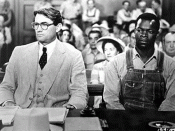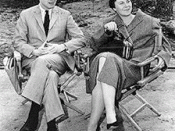Prejudice has caused the pain and suffering of others for many centuries. Some examples of this include the Holocaust and slavery in the United States. In To Kill a Mockingbird, by Harper Lee racism was the cause of much agony to the blacks of a segregated South. Along with blacks, other groups of people are judged unfairly just because of their difference from others. The prejudice and bigotry of society causes the oppression of people with differences. What was also apparent is the prejudice that people had to face when seeking to defend the rights of those minorities who were being oppressed.
Some who are discriminated against are those who are born differently than the majority. One person that is treated unfairly is Calpurnia, as you can see when Aunt Alexandra tried to get Atticus to fire Calpurnia, because in her eyes, Calpurnia wasn't a good enough female role model (p.136).
This is a prejudice action, because Calpurnia is as good as a role model as Aunt Alexandra, if not better. Calpurnia despite all the comments and prejudice against her carries on with life, whilst Aunt Alexandra has all the trappings of a white woman who thinks her position in life is preordained and everybody should know their place. If they do not then they are abnormal and should be subject to anger, which I would see as oppression and prejudice. Maybe Aunt Alexander was afraid that her view of blacks was wrong and that they were human beings after all and that was a frightening thought in the South.
Another person who is treated like an inferior is Scout. She is treated badly by her teacher, because she knew how to read. "She discovered that I was literate and looked at me with more than faint distaste.


